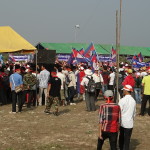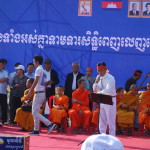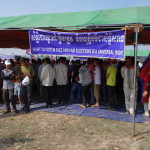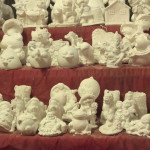Rubber Barons in Cambodia; or, how the World Bank and Deutsche Bank contribute to inequality in Cambodia and Laos
Cambodia – December 2013
- The early hours of the Cambodian National Rescue Party protest in Siem Reap – December 10, 2013
- The early hours of the Cambodian National Rescue Party protest in Siem Reap – December 10, 2013
- People wore orange headbands that asked, “where is my vote?”
- The CNRP flag (in blue) and the Kingdom of Cambodia flag (in red).
- From left, CNRP politicians, monks, and the MC. Although monks have been banned from protesting in Cambodia, they often break the law and sit on stage.
- One of the reasons CNRP continues to protest the July election results is because they claim people were intimidated to vote for the ruling party and/or votes were stolen outright.
- Despite the charges of corruption within and because of the ruling party, opposition politicians drive expensive cars like politicians of the ruling party.
- Cambodian statues and plants
- Despite the development of Siem Reap, many people continue to need to find fire wood.
- The sun sets on road 60 in Siem Reap.
- The latest craze at Road 60 is painting cheap clay objects. The objects include angry bird figurines and Hindu deities.
- People of all ages buy the 25 cent (1000R) figurines and then paint them.
- After painting an Angry Bird, it’s time to throw darts at balloons. Five darts cost $1.25 (5000R).
- The sun sets at Angkor Wat.
Steve Keen on the history of Bancor
The Bretton Woods conference on the international monetary system and financial order in 1944 is often cited as a major historical moment in the inception of contemporary educational development. That is because the International Bank for Reconstruction and Development, commonly known as the “World Bank,” was established at the conference, along with the International Monetary Fund (IMF) and the General Agreement on Tariffs and Trade (GATT). The Bretton Woods system, as these organisations are collectively referred to, turned to education in the 1960s after a decade and a half of reconstruction and development in Europe. The World Bank, which mainly re-built roads and infrastructure in war-torn Europe, added educational development in terms of human capital to justify entering many African countries. Eventually the World Bank (along with the IMF) had a presence in most low-income countries, offering loans for various development projects, often times with conditions attached to loan agreements. These conditional loans were apparent in the structural adjustment policies implemented in many countries in the 1980s, but most famously in Latin and South America.
The Bretton Woods system often receives blame for many of the problems within educational development. Steven Klees, Joel Samoff, and Nelly Stromquist write in their 2012 edited volume on the Bank in education:
The World Bank’s enthusiasm for its own policy pronouncements and practical advice has not been matched by sustained progress in the implementation of education as a human right or in the achievement of quality education for all in the settings in which it is most active. Regularly, its recommendations are a problem, not a solution. Of course, the determinants of education progress are multiple and situational. Still, since the World Bank intends its education policies and strategies to be prime movers for global education, it is essential to subject them to systematic, grounded, and critical scrutiny.
I tend to agree with much of the critique of the Bank in education. Nevertheless, I recently found an interesting lecture by the Post-Kaynesian economist, Steve Keen, on two competing proposals for the international monetary system and financial order offered at Bretton Woods. It’s a great piece of history that explains many of the financial problems the world faces today, especially after the Global Finical Crisis of 2007. Someone should write a research paper of educational development through the history presented by Keen below. Maybe that someone will be me.
The quiet acts of diplomacy
The AP reports there were extensive diplomatic efforts between the US and Iran in the lead up to Saturday’s 6-month deal signed in Geneva:
The United States and Iran secretly engaged in a series of high-level, face-to-face talks over the past year, in a high-stakes diplomatic gamble by the Obama administration that paved the way for the historic deal sealed early Sunday in Geneva aimed at slowing Tehran’s nuclear program.
This type of effort can only be seen as a “gamble” if the frame of reference is a Hawkish worldview of pre-emptive war, popularised by Rumsfeld & Co. under Bush II. This wasn’t a “gamble” in any sense, however, but rather a return to tough diplomatic efforts like Nixon pursued with China.
The AP reports of serious efforts to keep these multi-year (for a timeline, see NPR’s latest) talks that preceded the headline making talks in Geneva clandestine and out-of-view of both the mainstream media and US allies:
Hoping to keep the [diplomatic] channel open, Secretary of State John Kerry then visited Oman in May on a trip ostensibly to push a military deal with the sultanate but secretly focused on maintaining that country’s key mediation role, particularly after the Iranian election scheduled for the next month, the officials said.
[…]
It was only after that Obama-Rouhani phone call [in late September] that the U.S. began informing allies of the secret talks with Iran, the U.S. officials said.
Lower-level officials were at the heart of much of the diplomacy and met with Iranian counterparts in multiple locations, which Obama administration officials want to keep secret for possible future diplomatic efforts. Some of the administration’s low-level negotiators were out of sight through the very public talks in Geneva in November:
At this month’s larger formal nuclear negotiations between world powers and Iran in Geneva, Burns and Sullivan showed up as well, but the State Department went to great lengths to conceal their involvement, leaving their names off of the official delegation list.
They were housed at a different hotel than the rest of the team, used back entrances to come and go from meeting venues and were whisked into negotiating sessions from service elevators or unused corridors only after photographers left.
This secrecy was certainly a reason for France’s tough stance in early November:
In the end, though, it was not only divisions between Iran and the major powers that prevented a deal, but fissures within the negotiating group. France objected strenuously that the proposed deal would do too little to curb Iran’s uranium enrichment or to stop the development of a nuclear reactor capable of producing plutonium.
And Israel’s even tougher stance at the UN general assembly meeting where Netanyahu called Rouhani a “sheep in wolf’s clothing”:
In the end, Obama did exactly what he said he would do since the 2008 presidential campaign, despite the criticism he received from liberal politicians like Hilary Clinton who did not want to engage with “rouge” leaders:
http://www.youtube.com/watch?v=x1dSPrb5w_k
I can only hope that these latest talks between Iran and the US change the framework for understanding international relations and the use of diplomacy within the mainstream American polity. It isn’t a “gamble” to speak with other countries unless the standard operating procedure is animosity, mistrust, and suspicion of all other countries. It would be a welcome change if, at the very least, liberal politicians use a new language to speak of diplomacy in the future. Even further, I hope a new normal emerges within the institutions of US foreign policy because of these latest efforts to speak with Iran. In the next six months, we’ll see if Obama’s foreign policy legacy takes shape or falters like the roll-out of his domestic legacy, healthcare.org.
Thanksgiving 2013: Step by Step
Gallery

This gallery contains 15 photos.
Soros on new economic thinking
Revising the History of Karl Marx
John Gray reviews the latest book on Karl Mark by Jonathan Sperber. His take away:
The renewed popularity of Marx is an accident of history. If World War I had not occurred and caused the collapse of tsarism, if the Whites had prevailed in the Russian Civil War as Lenin at times feared they would and the Bolshevik leader had not been able to seize and retain his hold on power, or if any one of innumerable events had not happened as they did, Marx would now be a name most educated people struggled to remember. As it is we are left with Marx’s errors and confusions. Marx understood the anarchic vitality of capitalism earlier and better than probably anyone else. But the vision of the future he imbibed from positivism, and shared with the other Victorian prophet [Herbert Spencer] he faces in Highgate Cemetery, in which industrial societies stand on the brink of a scientific civilization in which the religions and conflicts of the past will fade way, is rationally groundless—a myth that, like the idea that Marx wanted to dedicate his major work to Darwin, has been exploded many times but seems to be ineradicable.














